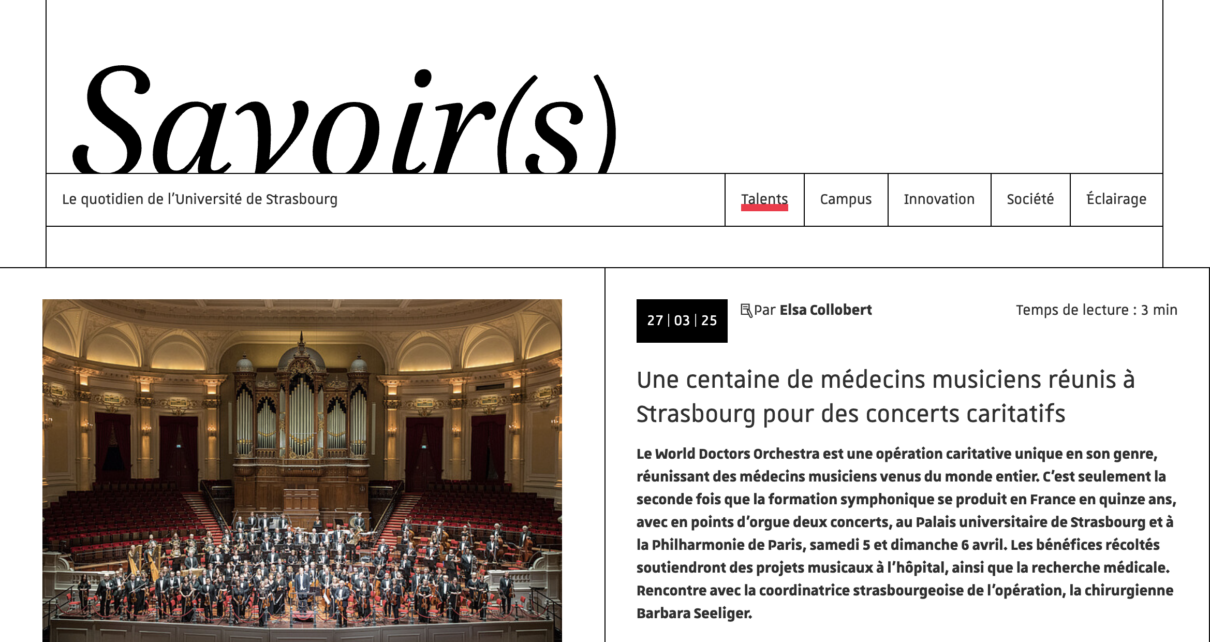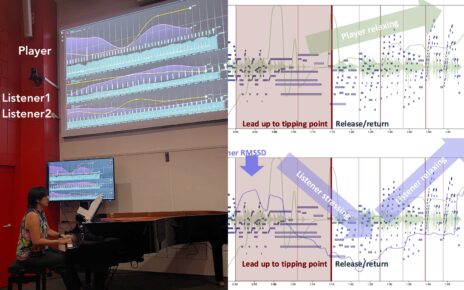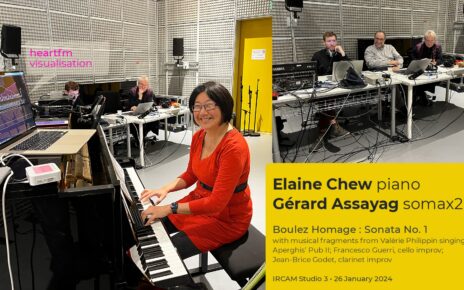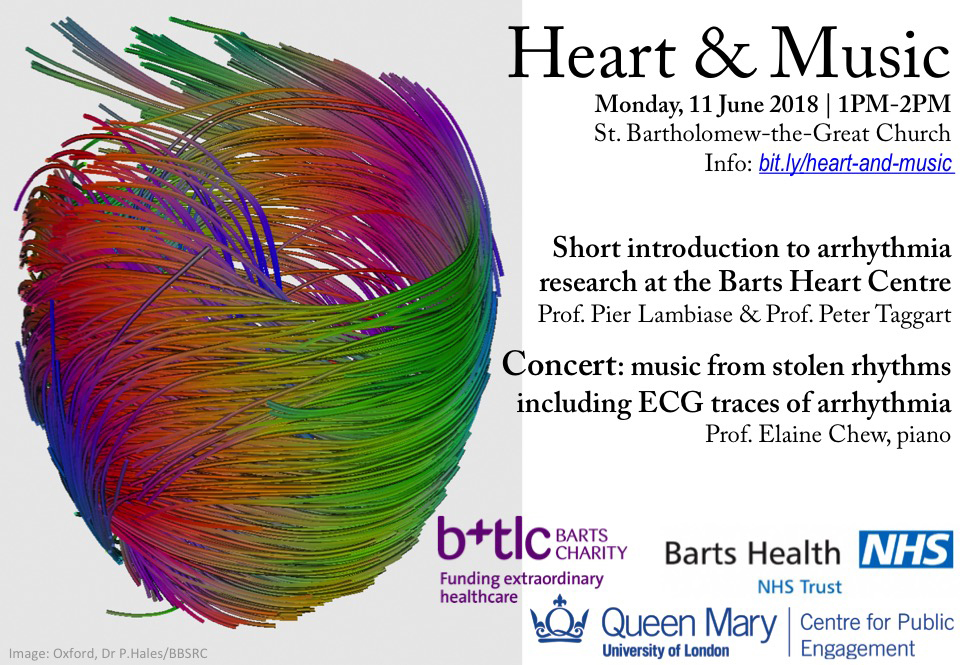The Cosmos Team is traveling to Strasbourg and Paris, France. Elaine Chew is a keynote speaker at the symposium Scientifically Sound, and the team aims to monitor the physician-musicians of the World Doctors Orchestra during music making. The University of Strasbourg Daily, Savois(s), interviews the organiser Barbara Seeliger:
Source: savoirs.unistra.fr/eclairage/une-centaine-de-medecins-musiciens-reunis-a-strasbourg-pour-des-concerts-caritatifs (translation by DeepL with minor edits)
A hundred doctor-musicians gather in Strasbourg for charity concerts
27.03.25 | by Elsa Collobert
The World Doctors Orchestra is a unique charity, brings together medical musicians from all over the world. This is only the second time in 15 years that the symphonic group has performed in France, culminating in two concerts at Strasbourg’s Palais Universitaire and the Philharmonie de Paris on Saturday April 5 and Sunday April 6. Profits raised will support musical projects in hospitals, as well as medical research. Meet the Strasbourg coordinator of the operation, surgeon Barbara Seeliger.
What’s on the agenda for the World Doctors Orchestra?
From Tuesday April 1, some of our doctor-musicians in small groups, backed up by ensembles from the Rhine University of the Arts (Hear), will be performing impromptu concerts at hospitals: in pediatrics at the Hautepierre campus, and in oral medicine and surgery at the Civil Hospital campus, as well as at the New Civil Hospital. All the more reason to surprise patients on their way to an examination, or staff on a break. We know that the “chamber music at lunchtime” formula is a big hit! On the same day, a symposium featuring a number of prestigious speakers on the theme of “Scientifically Sound” will pay tribute to Rhineland humanism.
After three days of rehearsals at the Palais universitaire, it’s time for the high points: the two symphony concerts, at the Palais universitaire on Saturday April 5 at 6 p.m., and at the Philharmonie de Paris at the same time the following day. The program has been designed to coincide with World Health Day, April 7, 2025.
Once incompressible costs have been deducted (equipment hire, catering, etc.), all profits will be donated to musical projects for patients and staff at various hospitals, as well as to medical research. In addition to concert proceeds, sponsors are invited by the Fondation de l’Université de Strasbourg et des Hôpitaux universitaires de Strasbourg to make a donation to the same causes.
We are very fortunate to be able to use the Palais universitaire free of charge for four days, and the large amphitheatre of the Institut de recherche contre les cancers de l’appareil digestif (Ircad) for the symposium.
What are the links between medicine and music?
There are many, and this will be one of the themes explored at the symposium, at the interface between the two! We have the great honor of welcoming researcher Elaine Chew, Professor at King’s College London. A pianist herself, she studies music as a diagnostic tool. This will be a major first on this scale: during the concert on Saturday evening, she will equip all the musicians with heart rate measuring instruments, in order to evaluate the differences according to their function in the ensemble, and the moments of the concert.
What’s more, our group of doctors from all over the world (see inset) proves that practising music is also good for you; and when will we see music on prescription? I’m a clarinettist, and during my training as a surgeon, Professor Jacques Marescaux was the only boss who encouraged me to pursue music as a complement to high-level surgery. An internship in his department during my year of study in Strasbourg, in 2003, was so decisive that I returned there, as an intern, and since 2017 as a research surgeon. And I still love minimally invasive and robotic surgery! During my first year in Strasbourg, joining the Orchestre Universitaire was a real breath of fresh air: I was able to meet some great people, and relax a little from the pressure of studying.
What is your role in the organization?
I like to define myself as a link between the orchestra, the places where we play, the foundation that centralizes donations, the university… An element in our organizing committee for the France 2025 project. In the same way as in my work as a surgeon at the Institut hospitalo-universitaire (IHU), I act as a link between patients, research and teaching, according to the principle of translational medicine, which creates a virtuous circle from bench to patient and back again. I fully support the message of the World Doctors Orchestra: access to healthcare must be guaranteed for all, regardless of geographical or political borders. It’s also about sending out a positive message, that of a project that creates a sense of community and togetherness, despite the distance!
→ Charity symphony concert, Saturday April 5, 6 pm, €20, by reservation
→ Scientifically Sound” symposium, Tuesday, April 1, 5:30 pm to 7:30 pm, registration required
→ Make a donation
What is the World Doctors Orchestra?
Founded in Germany in 2008, the World Doctors Orchestra (WDO) today brings together 2,000 musicians from 60 countries. Barbara Seeliger joined the WDO in Washington in 2011, ten years after 9/11. Germany, Chile, Canada, Anguilla, Denmark… Since then, she has taken part in a project every year within the group, which gives several concerts a year, each time in a different destination, in a variable-geography formation, depending on the availability of its members, all medical musicians – 40 sessions of 71 concerts, for a total of 2 million euros raised in the 15 years since the orchestra was founded.
2,000 musicians, 60 countries, 71 concerts, 2 million euros raised
The orchestra is under the direction of Stefan Willich, teacher and founder. In addition to the donations collected, the musicians themselves put their hands in their pockets, each donating €400 per project. Our modus operandi is a little different from that of a classical orchestra: everyone works on the scores on their own for three months, before rehearsing together just a few days before the concerts.
The orchestra is under the direction of Stefan Willich, teacher and founder. In addition to the donations collected, the musicians themselves put their hands in their pockets, each donating €400 per project. Our modus operandi is a little different from that of a classical orchestra: everyone works on the scores on their own for three months, before rehearsing together just a few days before the concerts.
Related posts:
• Elaine Chew Kenotes at World Doctors Orchestra Symposium Scientifically Sound




